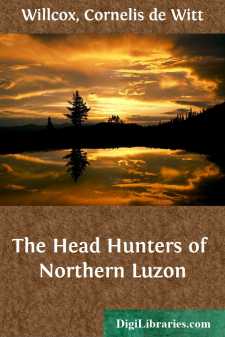Categories
- Antiques & Collectibles 13
- Architecture 36
- Art 48
- Bibles 22
- Biography & Autobiography 813
- Body, Mind & Spirit 142
- Business & Economics 28
- Children's Books 16
- Children's Fiction 13
- Computers 4
- Cooking 94
- Crafts & Hobbies 4
- Drama 346
- Education 46
- Family & Relationships 57
- Fiction 11829
- Games 19
- Gardening 17
- Health & Fitness 34
- History 1377
- House & Home 1
- Humor 147
- Juvenile Fiction 1873
- Juvenile Nonfiction 202
- Language Arts & Disciplines 88
- Law 16
- Literary Collections 686
- Literary Criticism 179
- Mathematics 13
- Medical 41
- Music 40
- Nature 179
- Non-Classifiable 1768
- Performing Arts 7
- Periodicals 1453
- Philosophy 64
- Photography 2
- Poetry 896
- Political Science 203
- Psychology 42
- Reference 154
- Religion 513
- Science 126
- Self-Help 84
- Social Science 81
- Sports & Recreation 34
- Study Aids 3
- Technology & Engineering 59
- Transportation 23
- Travel 463
- True Crime 29
The Head Hunters of Northern Luzon
Description:
Excerpt
Chapter I.
Highlanders of Northern Luzon.—Meaning of the word “Igorot.”—Trails.—The Mountain Province.—Nature of the country.
It is to be regretted that the people of the United States should in general show so little interest in the Philippine Islands. This lack of interest may be due to lack of knowledge; if this be so, then it is the duty of those better informed to do all that lies in their power to develop the interest now regrettably absent. Be this as it may, it is assumed here that most of our people do not know that a very large fraction of the inhabitants of the Philippines consists of the so-called wild men, and that of these the greatest group or collection is found in the mountains of Northern Luzon.
These mountaineers or highlanders constitute perhaps, all other things being equal, as interesting a body of uncivilized people as is to be found on the face of the earth to-day. The Spaniards, of course, soon discovered their existence, the first mention of them being made by De Morga, in his “Sucesos de las Islas Filipinas” (1609). He speaks
of them as inhabiting the interior of a rough mountainous country,where are “many natives who are not pacified, nor has anyone gone into their country, who call themselves Ygolotes,” Here we have the first form, the classic form according to Retana, of the word now universally writtenIgorrote, or in EnglishIgorot.The word itself means “highlanders,”golotbeing a Tagalog word for “mountain,” andIa prefix meaning “people of.” De Morga mentions the “Ygolotes” as owning rich mines of gold and silver, which “they work as there is need,” and he goes on to say that in spite of all the diligence made to know their mines, and how they work and improve them, the matter has come to naught, “because they are cautious with the Spaniards who go to them in search of gold, and say they keep it better guarded under ground than in their houses,”The Spaniards at a very early date sent armed exploring parties through the highlands and maintained garrisons here and there down to our own time.
But they never really held the country.The Church, too, early entered this territory, the field being given over to the Dominicans, who furnished many devoted missionaries to the cause. But here, too, failure must be recorded in respect of permanency of results in the really wild parts of the Highlands. It has remained for our own Government to get a real hold of the people of these regions, to win their confidence, command their respect, and exact their obedience in all relations in which obedience is proper and just.
The indispensable material condition of success was to make the mountain country accessible. Only those who have had the fortune to travel through this country can realize how difficult this endeavor has been and must continue to be, chiefly because of the great local complexity of the mountain system, but also because of the severely destructive storms of this region, with consequent torrential violence of the streams affected....


